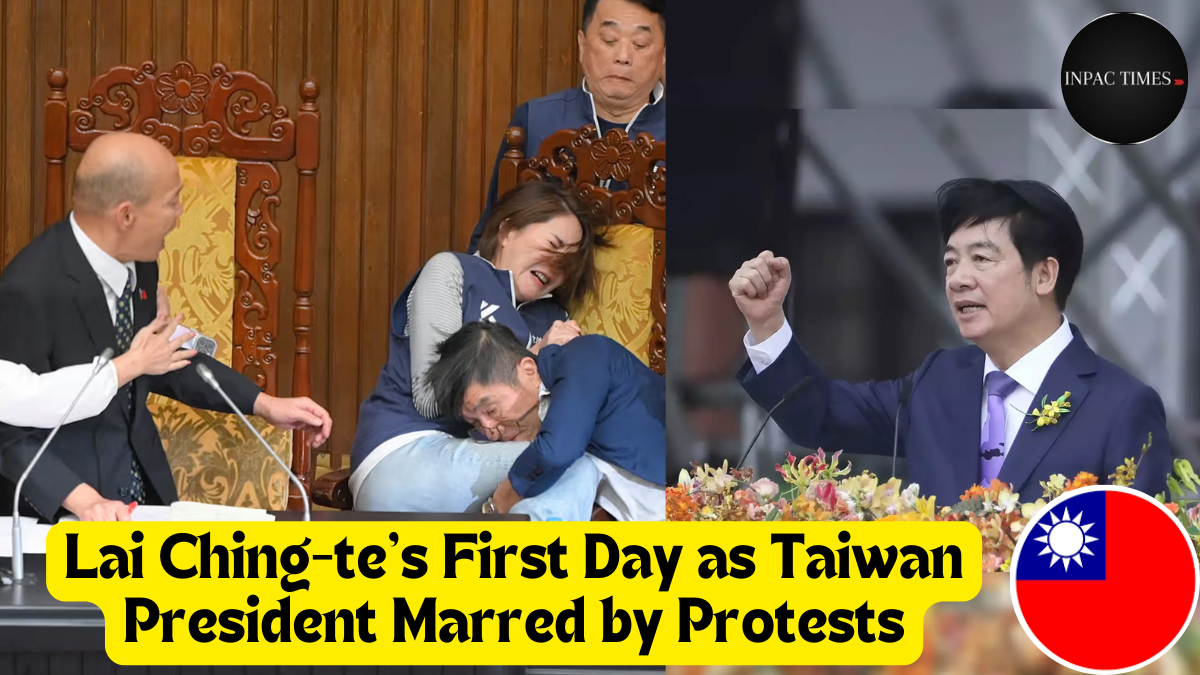TAIPEI – On Lai Ching-te’s first day as Taiwan’s president, he faced significant protests against a controversial bill in parliament, underscoring the challenges ahead for his administration, which lacks a legislative majority. Thousands of citizens gathered outside the legislative yuan, voicing their opposition to the bill that grants parliamentarians extraordinary powers to question anyone, including the president, with penalties for non-compliance. The day was a vivid demonstration of the vibrant and sometimes contentious nature of Taiwan’s democracy.
Lai Ching-te’s Presidential Inauguration and Protests
Lai’s inauguration was marked by a mix of celebration and dissent. The protests, which began in the morning and swelled by late afternoon despite inclement weather, were driven by concerns over the opposition’s attempt to push the bill through without proper review. Critics argue the bill threatens national security and is potentially unconstitutional, as it could compel answers to sensitive information and punish legislators for vaguely defined acts of “contempt of congress.”
Public Outcry Over Legislative Powers
Speakers at the protest included activists, politicians, and notable figures like Nymphia Wind, a US-based Taiwanese drag queen who recently won Ru Paul’s Drag Race. Wind emphasized the pervasive influence of politics in Taiwan and the necessity of public vigilance. The nearby Presbyterian church, known for its support of activism, provided food and shelter, with livestreams of the parliamentary sitting projected behind the pulpit. The session, controlled by opposition MPs donning body armor, was paused only for the 7 PM service, where the crowd engaged in prayer and hymns.
Political Tensions and Public Response
The contentious bill, which includes a substantial $61 billion in infrastructure spending that could strain Taiwan’s budget, particularly its defense allocation, prompted a physical altercation in parliament on Friday. New MP Puma Shen was hospitalized following the brawl, and he later criticized the opposition parties for their lack of understanding of the bill. He expressed concerns that the legislation could facilitate actions detrimental to Taiwan’s independence and security, aligning with China’s interests.
Lai Ching-te’s Inaugural Address
In his inauguration speech, Lai Ching-te referenced the recent parliamentary fracas, calling for rational governance and cooperation among political parties. He emphasized the importance of majority and minority parties respecting each other to maintain societal stability. Lai’s message underscored his administration’s commitment to democracy and urged China to cease its aggressive stance towards Taiwan.
International and Public Support
Lai’s inauguration was attended by representatives from 29 countries, including Taiwan’s 12 diplomatic allies and notable figures such as former US Secretary of State Mike Pompeo. Public festivities included a military parade and cultural performances, celebrating Taiwan’s heritage. Many attendees, including overseas Taiwanese, expressed their support for Lai and the island’s democratic values. Lisa Wu, who traveled from Los Angeles, praised Lai’s sincerity and expressed her hopes for the preservation of Taiwan’s democracy amid China’s threats.
Voices from the Crowd
Among the protesters, Jessica Fang, a 28-year-old IR policy student, condemned the opposition’s disregard for democratic processes and warned of the dangerous precedent the bill could set. Seventeen-year-old Guo criticized the procedural injustice of the bill and the Taiwan People’s Party’s deviation from its core values. The presence of young protesters highlighted the widespread concern over the legislative changes and their potential impact on Taiwan’s future.
A Call for Unity
As Lai Ching-te begins his presidency, the protests and legislative challenges foreshadow a turbulent term. However, his call for peace, cooperation, and the defense of Taiwan’s democratic values resonated with many. The protests, juxtaposed with the ceremonial inauguration, underscore the delicate balance Lai must maintain between governance, public sentiment, and the ongoing threat from China.
Conclusion
Despite the rocky start to his presidency, Lai Ching-te’s leadership has the potential to foster unity and resilience among Taiwan’s people. His commitment to democratic principles and rational governance provides a hopeful outlook for Taiwan’s future. As Lai urges cooperation and peace, there remains a strong sense of optimism that Taiwan will continue to thrive as a beacon of democracy and freedom in the region.

2 Comments
I very delighted to find this internet site on bing, just what I was searching for as well saved to fav
I find it incomprehensible that you are not more popular than you already are, given your intelligence. I was able to look at this topic from a number of angles because of your depth of knowledge. It appears that until a conversation turns to Woman gaga, neither men nor women seem to be really interested in things related to women. Continue your fantastic work.